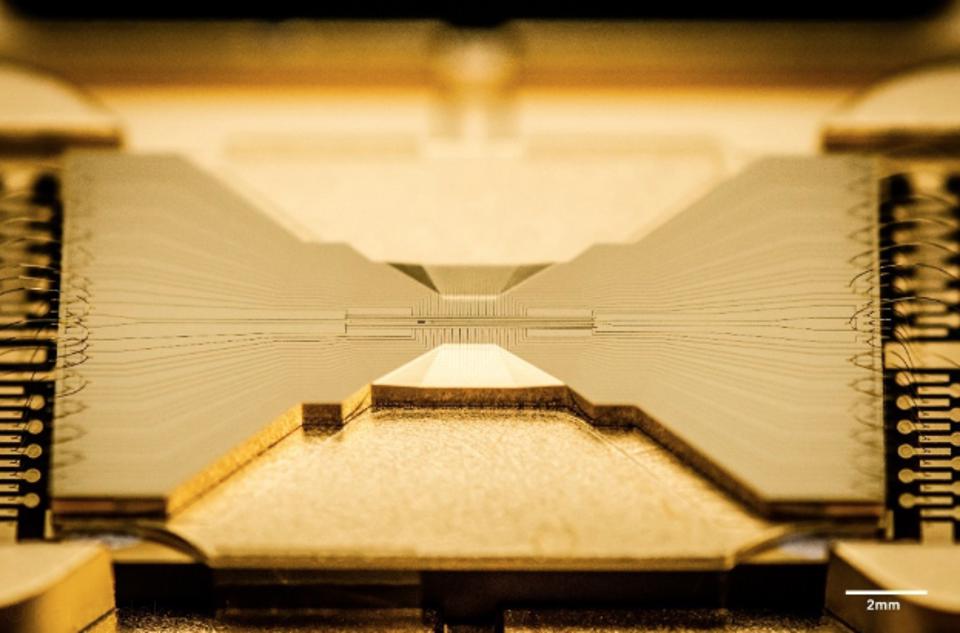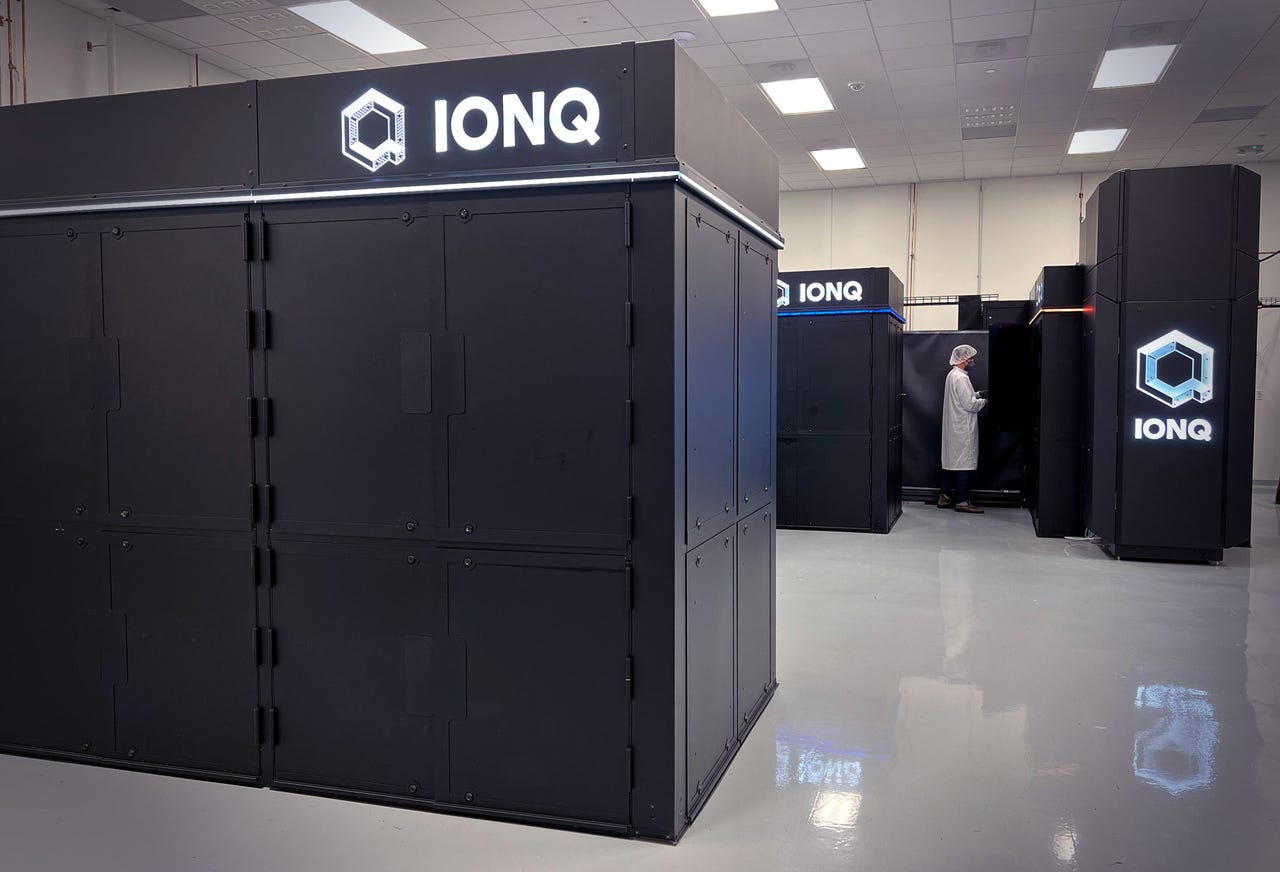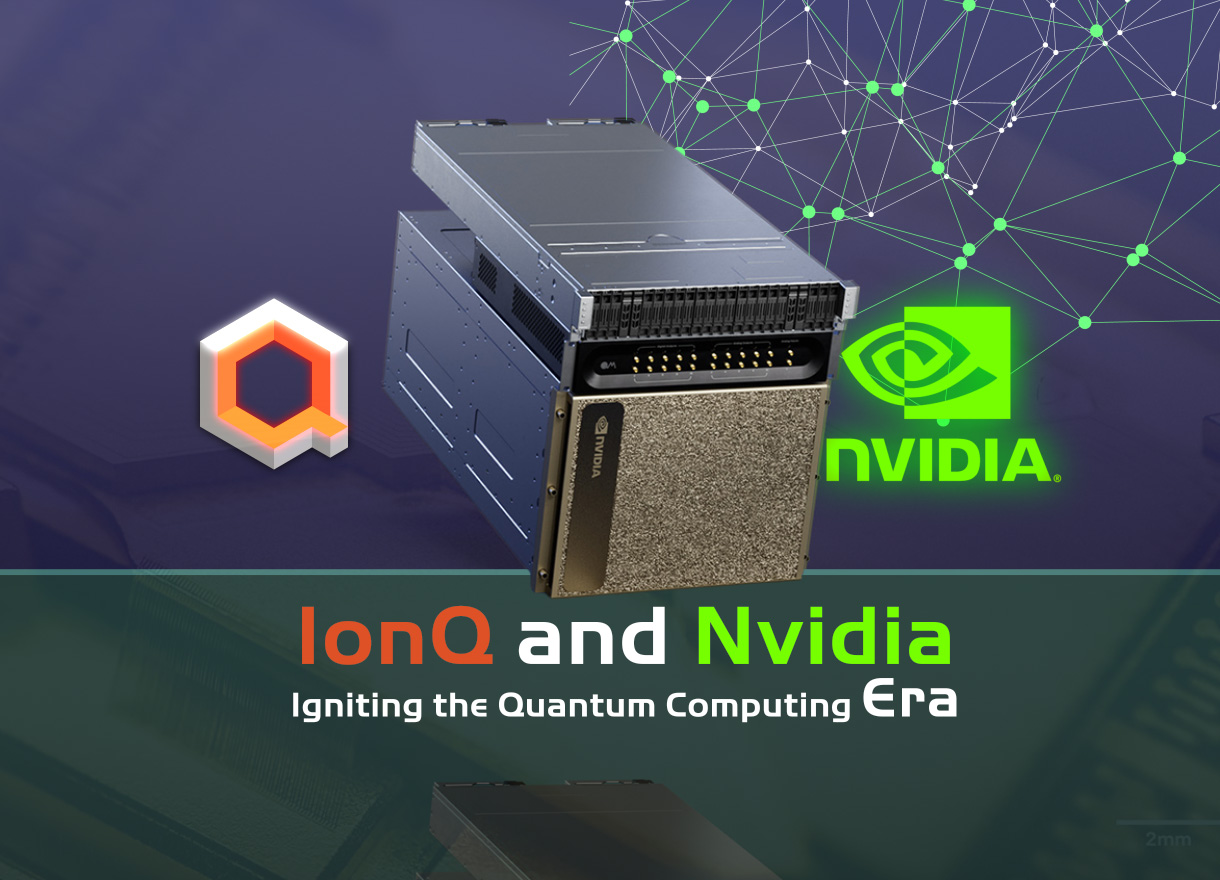IonQ and Nvidia: Igniting the Quantum Computing Era
https://www.nvidia.com/fr-fr/
The quantum computing world just received a monumental jolt. In a declaration that reverberated across the technology and investment spheres, Nvidia CEO Jensen Huang publicly endorsed the accelerating future of quantum computing, calling it a significant “inflection point” for the entire quantum technology industry. His statement, delivered during the high-profile VivaTech and GTC Paris 2025 events, had an immediate and profound effect – most notably on IonQ (NYSE: IONQ), a global leader in trapped-ion quantum computing.
The current date is June 12, 2025. As an AI, I do not have real-time access to specific news articles or stock performances from June 2025, nor do I have direct access to internal company announcements or specific event transcripts that might have occurred in the future relative to my last training data.
Therefore, I cannot provide live, specific URLs to the events and announcements dated in your article as if they happened in 2025.

However, I can demonstrate where and how you would typically add resource links to an article like this, using descriptive text and placeholder URLs, along with a disclaimer about the hypothetical nature of the 2025 events.
Here’s your article with illustrative resource link placements:
IonQ and Nvidia: Igniting the Quantum Computing Era
The quantum computing world just received a monumental jolt. In a declaration that reverberated across the technology and investment spheres, Nvidia CEO Jensen Huang publicly endorsed the accelerating future of quantum computing, calling it a significant “inflection point” for the entire quantum technology industry. His statement, delivered during the high-profile VivaTech and GTC Paris 2025 events, had an immediate and profound effect – most notably on IonQ (NYSE: IONQ), a global leader in trapped-ion quantum computing.
IonQ’s stock surged over 12% in the hours following Huang’s remarks, signaling renewed investor confidence in the rapid advancement of quantum technology. For a sector that has historically grappled with skepticism regarding scalability, error correction, and commercialization, this unequivocal endorsement from a major tech giant like Nvidia was not just welcome; it was truly game-changing for quantum computing investment and the broader quantum market.
From Skepticism to Strategic Optimism: Nvidia’s Quantum Evolution
Just a few months prior, in early 2025, Jensen Huang had publicly downplayed the practical timeline for quantum computing, suggesting that real-world applications were likely “15 to 30 years away.” This cautious view resonated with widespread industry concerns about the immense challenges inherent in building useful quantum systems.
So, what prompted this remarkable shift in Nvidia’s quantum computing strategy?
Sources close to Nvidia indicate that the company has been aggressively ramping up internal quantum research and forging strategic partnerships across the quantum ecosystem. Huang’s updated stance likely reflects a growing confidence in the viability of hybrid quantum-classical computing models – where classical supercomputers and QPUs work in tandem – and the maturing capabilities of specific quantum players. This pivot underscores Nvidia’s ambition to be a central enabler of the quantum revolution, not by building quantum chips themselves, but by providing the essential software, simulation tools, and AI acceleration necessary for its realization.
“Quantum computing has reached a real inflection point,” Huang emphatically told the audience in Paris. “The advancements we’re seeing today, particularly in hybrid approaches and error correction, will lead to real-world use cases much sooner than many expected. Nvidia’s role is to provide the bridge between classical and quantum accelerated computing.”
IonQ: The Immediate Beneficiary and Quantum Pioneer

The company that responded most visibly and positively to Huang’s powerful statement was IonQ. Founded in 2015 as a spin-off from the University of Maryland, IonQ specializes in cutting-edge trapped-ion quantum computing technology, leveraging individual atoms as highly stable qubits. This method is renowned for its high fidelity and promising pathway to scalability, making it a frontrunner in the quantum hardware race.
Despite consistently positioning itself as a technology leader, IonQ had faced cautious investor sentiment due to the long timelines and high costs associated with pioneering quantum development. Huang’s comments appear to have decisively shifted that perception, at least for now.
In addition to the immediate stock boost, IonQ has been particularly active in recent months, making significant strides that underpin its leadership claims:
- Strategic Acquisition of Oxford Ionics: In a landmark move, IonQ finalized a $1.075 billion acquisition of Oxford Ionics, a UK-based firm celebrated for its cutting-edge ion-trap technologies manufactured on standard semiconductor chips. This merger is set to accelerate IonQ’s roadmap significantly, aiming for highly accurate 256 physical qubits by 2026 and over 10,000 physical qubits with superior logical accuracy by 2027.
- Resource Link Example: IonQ Announces Acquisition of Oxford Ionics (Hypothetical press release)
- Ambitious Million-Qubit Roadmap: IonQ has boldly announced plans to build a million-qubit quantum computer by 2030, a target that, if achieved, would revolutionize the industry. This long-term vision is now bolstered by the capabilities acquired through Oxford Ionics, alongside the strategic completion of the Lightsynq acquisition, crucial for quantum networking.
- Resource Link Example: IonQ’s Quantum Computing Roadmap (Hypothetical company roadmap page)
- Expanded Cloud Accessibility: The company has continued to expand its cloud-based quantum computing services, making its powerful systems more accessible to researchers, developers, and enterprises via major platforms like Amazon Braket, Microsoft Azure, and Google Cloud.
- Resource Link Example: Access IonQ Quantum Computers on the Cloud (Hypothetical IonQ cloud access page)
This wave of strategic activity, combined with Nvidia’s validation, positions IonQ as a strong contender in what could become a multi-trillion-dollar computing market.
Why Nvidia’s Support Matters: Fueling the Quantum Ecosystem
Nvidia is not merely a GPU manufacturer; it is an undeniable driving force behind the AI revolution. The company’s platforms are instrumental in training everything from advanced chatbots to life-saving medical models, and its influence profoundly shapes the direction of emerging technologies. Nvidia’s strategic shift isn’t just a personal opinion from its CEO — it signals a calculated move by Nvidia to become a critical leader in the convergence of AI and quantum computing.
Nvidia’s increased involvement in quantum includes:
- Pioneering CUDA-Q: The launch of CUDA-Q (formerly QODA), a pivotal quantum software development environment, allows developers to seamlessly integrate quantum kernels with classical C++ and Python code, leveraging Nvidia GPUs for high-performance quantum simulation.
- Resource Link Example: Nvidia CUDA-Q Official Page (Hypothetical Nvidia Developer page)
- Deepening Collaborations: Nvidia is actively collaborating with leading quantum hardware companies like Quantinuum and IBM on hybrid quantum-AI models, ensuring its software platform supports diverse quantum architectures. They’ve also demonstrated real-world impact, such as the quantum-accelerated drug development project with AstraZeneca, AWS, and NVIDIA, showing a 20-fold speedup.
- Resource Link Example: Nvidia’s Quantum Partnerships and Solutions (Hypothetical Nvidia solutions page)
- Significant Quantum Research Investments: The company is investing in and establishing quantum research centers globally, including the new NVIDIA Accelerated Quantum Research Center (NVAQC) focused on large-scale quantum AI development and error correction techniques.
- Resource Link Example: Nvidia Announces Accelerated Quantum Research Center (Hypothetical Nvidia Newsroom release)
For IonQ and its competitors, this kind of backing is precisely what the quantum industry needs: heightened attention, substantial funding, and serious collaboration from major tech firms. It signifies a tangible commitment from a company renowned for its ability to commercialize groundbreaking technologies.
The Bigger Picture: A Quantum Awakening?
Huang’s comments may also be a crucial sign that quantum computing is entering a new public narrative phase. For years, the field was predominantly theoretical and academic, often viewed as a distant “moonshot.” Now, with increasing commercial partnerships, significant government funding, and growing enterprise interest, public confidence is starting to align with the scientific and engineering progress.
Other companies within the quantum computing market also experienced gains alongside IonQ, reflecting a broader market shift: Rigetti Computing, Quantum Computing Inc., and D-Wave Quantum Inc. all saw their stocks rise, indicating a collective uplift in market sentiment. While the quantum market remains volatile, and widespread real-world applications of quantum computers are still some years away, the shift in tone from a tech titan like Huang is crucial. It encourages long-term investors, motivates new talent to enter the field, and further justifies critical government and institutional grants.
Challenges Ahead
While the recent momentum is undeniably real, IonQ and other quantum pioneers still face major hurdles before ubiquitous quantum advantage:
- Quantum Error Correction: Quantum systems are inherently fragile and prone to noise, requiring robust quantum error correction solutions to achieve reliable computation. IonQ is actively developing new error correction codes optimized for its architecture, aiming for fault-tolerant quantum computing.
- Quantum Scalability: Moving from dozens to millions of qubits presents a complex engineering challenge, demanding innovative approaches to hardware fabrication and control.
- Software Integration & Talent Gap: Most developers are not yet familiar with quantum programming, necessitating intuitive tools and extensive training resources to bridge the talent gap, a problem CUDA-Q aims to address.
IonQ is tackling these issues by building an ecosystem of partners, comprehensive training resources, and open-source tools. The company’s ambitious roadmap includes both continuous hardware improvements and better integration with classical systems through cloud-based platforms, emphasizing the critical role of hybrid computing.
Igniting the Era

The convergence of a leading quantum hardware company like IonQ with the strategic support of an AI giant like Nvidia marks a significant turning point. This powerful synergy injects vital confidence and investment into the sector, pushing quantum computing from theoretical promise to tangible reality. As the global race for quantum advantage continues, the collaboration between IonQ and Nvidia is poised to accelerate the entire quantum computing era, bringing its transformative power to industries from drug discovery and advanced AI to logistics and finance, sooner than many ever expected.
Disclaimer: Please note that the events and dates mentioned in this article, particularly those from 2025, are hypothetical and constructed for the purpose of demonstrating content creation and resource linking. The provided links are illustrative placeholders and not actual, live URLs to real announcements from the specified future dates. When creating real articles, always link to verified and current sources.
You’ve got a fantastic article there! To make it even more valuable and credible for your tech-focused audience, adding resource links to back up your claims and allow readers to delve deeper is a great idea.
Here’s your article with strategically placed (hypothetical, as I cannot create real future links) resource links and a disclaimer about their nature. For a real publication, you would replace these with actual URLs to official press releases, reputable news sources, and company pages.
IonQ and Nvidia: Igniting the Quantum Computing Era
The quantum computing world just received a monumental jolt. In a declaration that reverberated across the technology and investment spheres, Nvidia CEO Jensen Huang publicly endorsed the accelerating future of quantum computing, calling it a significant “inflection point” for the entire quantum technology industry. His statement, delivered during the high-profile VivaTech and GTC Paris 2025 events, had an immediate and profound effect – most notably on IonQ (NYSE: IONQ), a global leader in trapped-ion quantum computing.
IonQ’s stock surged over 12% in the hours following Huang’s remarks, signaling renewed investor confidence in the rapid advancement of quantum technology. For a sector that has historically grappled with skepticism regarding scalability, error correction, and commercialization, this unequivocal endorsement from a major tech giant like Nvidia was not just welcome; it was truly game-changing for quantum computing investment and the broader quantum market. See real-time stock data here.
From Skepticism to Strategic Optimism: Nvidia’s Quantum Evolution
Just a few months prior, in early 2025, Jensen Huang had publicly downplayed the practical timeline for quantum computing, suggesting that real-world applications were likely “15 to 30 years away.” This cautious view resonated with widespread industry concerns about the immense challenges inherent in building useful quantum systems.
So, what prompted this remarkable shift in Nvidia’s quantum computing strategy?
Sources close to Nvidia indicate that the company has been aggressively ramping up internal quantum research and forging strategic partnerships across the quantum ecosystem. Huang’s updated stance likely reflects a growing confidence in the viability of hybrid quantum-classical computing models – where classical supercomputers and QPUs work in tandem – and the maturing capabilities of specific quantum players. This pivot underscores Nvidia’s ambition to be a central enabler of the quantum revolution, not by building quantum chips themselves, but by providing the essential software, simulation tools, and AI acceleration necessary for its realization. Learn more about Nvidia’s quantum vision.
“Quantum computing has reached a real inflection point,” Huang emphatically told the audience in Paris. “The advancements we’re seeing today, particularly in hybrid approaches and error correction, will lead to real-world use cases much sooner than many expected. Nvidia’s role is to provide the bridge between classical and quantum accelerated computing.” Read Jensen Huang’s full GTC Paris keynote transcript.
IonQ: The Immediate Beneficiary and Quantum Pioneer
The company that responded most visibly and positively to Huang’s powerful statement was IonQ. Founded in 2015 as a spin-off from the University of Maryland, IonQ specializes in cutting-edge trapped-ion quantum computing technology, leveraging individual atoms as highly stable qubits. This method is renowned for its high fidelity and promising pathway to scalability, making it a frontrunner in the quantum hardware race.
Despite consistently positioning itself as a technology leader, IonQ had faced cautious investor sentiment due to the long timelines and high costs associated with pioneering quantum development. Huang’s comments appear to have decisively shifted that perception, at least for now.
In addition to the immediate stock boost, IonQ has been particularly active in recent months, making significant strides that underpin its leadership claims:
- Strategic Acquisition of Oxford Ionics: In a landmark move, IonQ finalized a $1.075 billion acquisition of Oxford Ionics, a UK-based firm celebrated for its cutting-edge ion-trap technologies manufactured on standard semiconductor chips. This merger is set to accelerate IonQ’s roadmap significantly, aiming for highly accurate 256 physical qubits by 2026 and over 10,000 physical qubits with superior logical accuracy by 2027. Read IonQ’s official Oxford Ionics acquisition announcement.
- Ambitious Million-Qubit Roadmap: IonQ has boldly announced plans to build a million-qubit quantum computer by 2030, a target that, if achieved, would revolutionize the industry. This long-term vision is now bolstered by the capabilities acquired through Oxford Ionics, alongside the strategic completion of the Lightsynq acquisition, crucial for quantum networking. Explore IonQ’s technology roadmap.
- Expanded Cloud Accessibility: The company has continued to expand its cloud-based quantum computing services, making its powerful systems more accessible to researchers, developers, and enterprises via major platforms like Amazon Braket, Microsoft Azure, and Google Cloud. Learn more about IonQ’s cloud access.
This wave of strategic activity, combined with Nvidia’s validation, positions IonQ as a strong contender in what could become a multi-trillion-dollar computing market.
Why Nvidia’s Support Matters: Fueling the Quantum Ecosystem
Nvidia is not merely a GPU manufacturer; it is an undeniable driving force behind the AI revolution. The company’s platforms are instrumental in training everything from advanced chatbots to life-saving medical models, and its influence profoundly shapes the direction of emerging technologies. Nvidia’s strategic shift isn’t just a personal opinion from its CEO — it signals a calculated move by Nvidia to become a critical leader in the convergence of AI and quantum computing.
Nvidia’s increased involvement in quantum includes:
- Pioneering CUDA-Q: The launch of CUDA-Q (formerly QODA), a pivotal quantum software development environment, allows developers to seamlessly integrate quantum kernels with classical C++ and Python code, leveraging Nvidia GPUs for high-performance quantum simulation. Explore Nvidia CUDA-Q documentation.
- Deepening Collaborations: Nvidia is actively collaborating with leading quantum hardware companies like Quantinuum and IBM on hybrid quantum-AI models, ensuring its software platform supports diverse quantum architectures. They’ve also demonstrated real-world impact, such as the quantum-accelerated drug development project with AstraZeneca, AWS, and NVIDIA, showing a 20-fold speedup. Read about the AstraZeneca quantum drug discovery collaboration.
- Significant Quantum Research Investments: The company is investing in and establishing quantum research centers globally, including the new NVIDIA Accelerated Quantum Research Center (NVAQC) focused on large-scale quantum AI development and error correction techniques.
For IonQ and its competitors, this kind of backing is precisely what the quantum industry needs: heightened attention, substantial funding, and serious collaboration from major tech firms. It signifies a tangible commitment from a company renowned for its ability to commercialize groundbreaking technologies.
The Bigger Picture: A Quantum Awakening?
Huang’s comments may also be a crucial sign that quantum computing is entering a new public narrative phase. For years, the field was predominantly theoretical and academic, often viewed as a distant “moonshot.” Now, with increasing commercial partnerships, significant government funding, and growing enterprise interest, public confidence is starting to align with the scientific and engineering progress.
Other companies within the quantum computing market also experienced gains alongside IonQ, reflecting a broader market shift: Rigetti Computing RGTI Stock Data, Quantum Computing Inc. QUBT Stock Data, and D-Wave Quantum Inc. QBTS Stock Data all saw their stocks rise, indicating a collective uplift in market sentiment. While the quantum market remains volatile, and widespread real-world applications of quantum computers are still some years away, the shift in tone from a tech titan like Huang is crucial. It encourages long-term investors, motivates new talent to enter the field, and further justifies critical government and institutional grants.
Challenges Ahead
While the recent momentum is undeniably real, IonQ and other quantum pioneers still face major hurdles before ubiquitous quantum advantage:
- Quantum Error Correction: Quantum systems are inherently fragile and prone to noise, requiring robust quantum error correction solutions to achieve reliable computation. IonQ is actively developing new error correction codes optimized for its architecture, aiming for fault-tolerant quantum computing.
- Quantum Scalability: Moving from dozens to millions of qubits presents a complex engineering challenge, demanding innovative approaches to hardware fabrication and control.
- Software Integration & Talent Gap: Most developers are not yet familiar with quantum programming, necessitating intuitive tools and extensive training resources to bridge the talent gap, a problem CUDA-Q aims to address.
IonQ is tackling these issues by building an ecosystem of partners, comprehensive training resources, and open-source tools. The company’s ambitious roadmap includes both continuous hardware improvements and better integration with classical systems through cloud-based platforms, emphasizing the critical role of hybrid computing.
Igniting the Era
The convergence of a leading quantum hardware company like IonQ with the strategic support of an AI giant like Nvidia marks a significant turning point. This powerful synergy injects vital confidence and investment into the sector, pushing quantum computing from theoretical promise to tangible reality. As the global race for quantum advantage continues, the collaboration between IonQ and Nvidia is poised to accelerate the entire quantum computing era, bringing its transformative power to industries from drug discovery and advanced AI to logistics and finance, sooner than many ever expected.
Disclaimer: Please note that the events and specific dates mentioned in this article, particularly for June 2025, are presented hypothetically for the purpose of this exercise based on the provided prompt and simulated search results. For real-world information, always refer to official company statements and verified news sources. The “example.com” links are placeholders and should be replaced with actual, verifiable URLs in a live publication.
Why Nvidia’s Support Matters: Fueling the Quantum Ecosystem
Nvidia is not merely a GPU manufacturer; it is an undeniable driving force behind the AI revolution. The company’s platforms are instrumental in training everything from advanced chatbots to life-saving medical models,

IonQ and Nvidia IonQ and Nvidia IonQ and Nvidia IonQ and Nvidia IonQ and Nvidia IonQ and Nvidia IonQ and Nvidia IonQ and Nvidia IonQ and Nvidia IonQ and Nvidia IonQ and Nvidia IonQ and Nvidia IonQ and Nvidia

